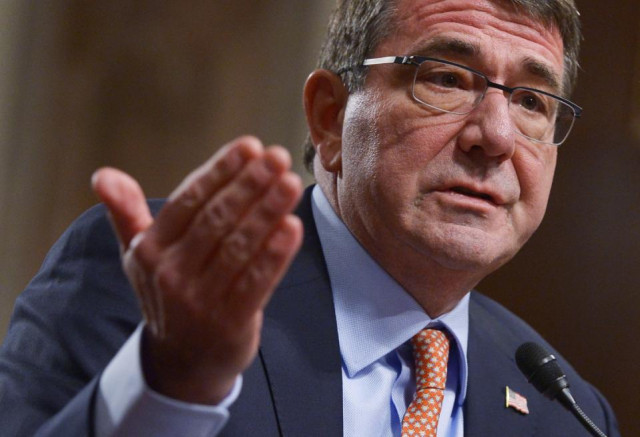Pentagon chief hails peshmerga as model for Iraq
Pentagon chief speaks in Kurdish capital Arbil in front of members of US-led coalition deployed in Kurdistan

Ashton Carter in the Dirksen Senate Office Building on Capitol Hill in Washington, DC, on February 4, 2015. PHOTO: AFP
The US defence secretary, on the second day of his first visit to Iraq since taking office earlier this year, praised the efforts of what is the region's de facto army.
"We are trying to build a force throughout the territory of Iraq, and someday in Syria, that can do" what the peshmerga have achieved, Carter said.
Read: Texas attack 'inspired' but not directed by IS: Pentagon chief
He was speaking in the Kurdish capital Arbil in front of members of the US-led coalition deployed in Kurdistan to help push back the Islamic State group.
Moments earlier, he met Kurdish President Massud Barzani.
Carter "commended President Barzani on the battlefield successes they've achieved on the ground in coordination with US and coalition air power," a Pentagon statement said.
Several high-ranking Kurdish military officials attended the talks with Carter, on his first trip to Iraq since taking office earlier this year.
Read: Islamic State seen as potent force a year after caliphate declaration Pentagon
The threat posed to Arbil by an IS advance early last August was one of the reasons cited days later by US President Barack Obama for announcing US air strikes.
An international coalition has since developed and carried out thousands of air strikes, many in support of peshmerga forces fighting IS.
More than 1,200 peshmerga fighters have been killed in fighting with IS, which last year swept into several areas controlled by the Kurds, who are now trying to take them back.
The coalition has repeatedly stressed that air strikes were only useful if carried out in support of well-organised ground offensives.
Carter had expressed his frustration in May after Iraqi government forces, who had held on for almost 18 months in Ramadi, the capital of the western province of Anbar, completely buckled and lost the city.
"We have an issue with the will of the Iraqis to fight ISIL and defend themselves," he had said at the time, using another acronym for IS.
Carter was in Baghdad on Thursday and said the United States was ready to do more to help Baghdad's forces reconquer the ground they lost last year but added that the army needed to shape up.
"We are willing to do more... when and if (the Iraqis) develop capable, motivated forces of their own that can take and retain territory," he said as he met some of the 3,500 US military trainers and advisers in Iraq.
Iraqi forces are upping the pressure on IS in its stronghold of Anbar, a vast Sunni province which stretches from the outskirts of Baghdad to the borders with Syria, Jordan and Saudi Arabia.
Iraqi troops and paramilitary forces have largely encircled Ramadi as well as Fallujah, the province's other main city, paving the way for major offensives.
Relations are strained between the federal government in Baghdad and the autonomous administration in Kurdistan.
Barzani, whose forces have de facto seized several oil-rich, contested areas on the back of last year's IS offensive, has threatened to organise a referendum on independence.
Carter stressed during his meeting with the veteran Kurdish leader Friday that Washington's assistance to Kurdistan as part of the war against IS would not bypass Baghdad.
"The secretary also noted that the United States would continue working by, with, and through the government of Iraq to support Kurdish forces in the fight against ISIL," the Pentagon statement said.
IS is also under increasing pressure in Syria, where Turkish fighter jets bombed IS positions for the first time Friday, potentially marking a major shift in the conflict.
After months of negotiations, Turkey also finally gave the green light for the US to use a key air base in its south for its air strikes against IS.
NATO member Turkey had been accused of colluding with IS by allowing the jihadists to use its territory as a rear base and not fulfilling its role in the coalition.



















COMMENTS
Comments are moderated and generally will be posted if they are on-topic and not abusive.
For more information, please see our Comments FAQ